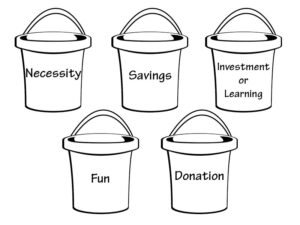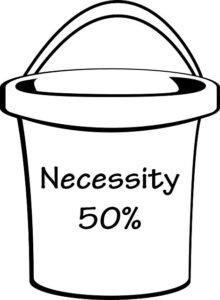When I was in school, I tried to save pennies whenever possible. Eventually, I developed the habit of saving 50 cents every day. When my savings reached 50 or 100 bucks, I suddenly needed to buy something, and those savings disappeared. I believe this has happened to you as well. We save and save, then suddenly it’s gone. Have you ever wondered why this happens?
It’s because that money didn’t have a clear purpose. If we assign our savings clear goals, they won’t disappear so easily. But how can I assign goals to specific amounts of money?
This concept comes from the bucket theory in the book “The Richest Man in Babylon” by George S. Clason. I envision five buckets—not physical buckets, but mental categories—and name them necessity, savings, investment/learning, fun, and donation.

Necessity
First, I calculate how much money I spend on monthly expenses such as food, clothing, transport, rent, and utilities. If these expenses are around 40-50% of my monthly salary, that’s great. Let’s say my monthly expenses are 50% of my salary. I will do my best not to spend more than 50% from this bucket. This helps keep my necessities in check.

Savings
Next, I allocate 20% of my salary to a Savings bucket. This is a forbidden bucket, meaning I won’t touch or spend money from it unless there is an emergency. Emergencies might include large medical expenses or needing 3-6 months of savings if I become jobless. I must be determined not to touch this money for necessary expenses, vacations, or anything else that is not an emergency. Since this is a forbidden bucket, I recommend keeping this money in a fixed deposit or monthly deposit bank account where the rate of return is high.

Investment or Learning
Thirdly, I need to invest to become wealthy because savings alone won’t make me rich. Investments can take various forms: a business, a bank, the stock market, gold, etc. Another way to invest is to invest in yourself. With other investment methods, you might get an 8-20% return annually, but by investing in yourself, you can increase that return to 1000% or more. How can you invest in yourself? You can read books, join a course, or simply learn from the internet. In “The Richest Man in Babylon,” it says, “Pay yourself first.” This means investing in yourself so that others will pay you more for what you offer. I allocate 20% of my money for investment. From that money, I invest some in banks and stocks and use some to learn different things to enhance my skills.

Fun
I’ve covered my daily expenses, my future savings. I’m constantly investing in wealth and in myself, where is the fun in that? By doing these things repeatedly, I will become exhausted. That’s where the fun bucket comes in. I spend 5% of my monthly salary on fun activities. It may be eating my favorite food at a restaurant, going on vacation, or purchasing things that I want but that aren’t necessities. If I spend too much money on fun activities without allocating money for other needs, there will be self-guilt in future. But even if I use the full 5% amount from the fun bucket, there will be no guilt.

Donation
Finally, there is the Donation bucket. What is the meaning of our existence if we don’t help others? Did you know that many people in Africa eat biscuits made of mud just to survive?

Although most of us can’t help them directly, we can help our relatives, neighbors, and street people who are in need. I allocate 5% for donation. You can increase or decrease this amount and adjust it with other buckets. But spend at least 1% of your earnings to improve others’ lives.

Getting rich doesn’t mean you’re earning more. If you increase your spending in proportion to your earnings, you will find yourself in the same position as when you were earning less. These allocations are not mandatory. For example, if your basic needs are 90% of your salary, you won’t be able to allocate the other buckets as I described. Make your own allocations. If you have to allocate 1% to investment based on your situation, that’s okay. The important thing is to build the habit of allocating money and only spending from their specific buckets.
Gradually, your savings will increase, your investments will grow, and your earnings will rise. When that happens, don’t increase your expenses significantly. Try to enlarge your investment bucket as much as possible. This loop will continue until you achieve financial freedom.



